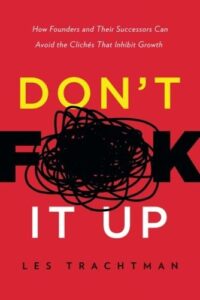Being a Second CEO
Les Trachtman specializes in what he calls being a “second CEO,” replacing founders to help grow and scale companies. In…

Les Trachtman specializes in what he calls being a “second CEO,” replacing founders to help grow and scale companies. In…

Chuck Runyon is the co-founder and CEO of Anytime Fitness, the world’s largest co-ed fitness club franchise. With more than…

True story: The Austin office of a large tech company once had six levels of management between its site president…

Dave O’Flanagan is CEO and Co-founder of Dublin-based Boxever. The company helps airlines such as Emirates, Aer Lingus, and Air New…

Product manager – It’s the one individual role that best prepares people to be a CEO. It’s a great training…

When you’ve been around the tech world as long as I have, you know a lot of people. I am…